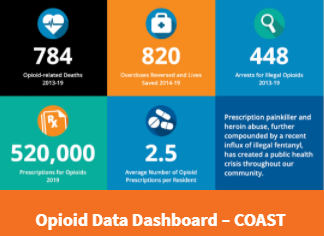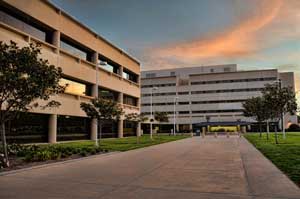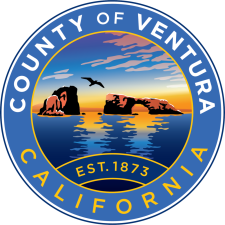Oxnard, CA – El 1 de septiembre, el Departamento de Salud Conductual del Condado de Ventura (VCBH) lanzará un panel de datos público que brinda a la comunidad estadísticas importantes sobre el consumo de drogas relacionadas con los opioides. El público puede acceder a este panel de fácil uso visitando www.venturacountyresponds.org.
La Dra. Loretta Denering, Jefa de la División de Servicios para el Consumo de Sustancias del Condado, dijo que el nuevo panel será un recurso valioso para los residentes del condado. “Se muestran las tendencias y los recursos locales, incluidos los lugares de tratamiento de adicciones, los lugares de entrega de medicamentos recetados y las estrategias de prevención de sobredosis”. También señaló que “hasta ahora, nunca ha habido un sitio único”.
Como respuesta a la crisis de opioides, VCBH ha priorizado un mayor acceso a la atención para los usuarios de opioides. En octubre de 2018, VCBH recibió una subvención federal que, en colaboración con varias agencias, incluidas Salud Pública, Servicios Médicos de Emergencia, Atención Ambulatoria, la Oficina del Sheriff y la Oficina del Médico Forense, ha permitido formas más innovadoras de abordar la crisis. Uno de los resultados de la subvención fue crear este panel para la comunidad, además de rastrear la naturaleza y el alcance de la crisis a nivel local, así como brindar más servicios al público, especialmente a aquellos con un trastorno por consumo de opioides.
Otros esfuerzos de VCBH y sus socios incluyen:
• Creación de un Grupo de Trabajo sobre Medicamentos con Receta y Heroína en 2012 para responder al desvío de drogas y al llamado "Doctor Shopping", donde los usuarios de drogas involucradas con opioides buscaban médicos dispuestos a proporcionar analgésicos fuertes que los pacientes usarían o venderían ilegalmente en la calle.
• Equipar y capacitar a todas las agencias locales de aplicación de la ley para que utilicen naloxona, un fármaco que revierte las sobredosis. Varias agencias informan de casos exitosos de reversión de sobredosis en el último año.
• Campañas en redes sociales y mensajes para alentar a los familiares y seres queridos a aprender cómo responder ante una sobredosis accidental y los servicios de tratamiento disponibles en todo el condado.
Según los Centros para el Control y la Prevención de Enfermedades (CDC), en la actualidad mueren más estadounidenses por sobredosis de drogas que por cualquier otro tipo de muerte accidental, más que por accidentes de tránsito y violencia con armas de fuego juntos. En el condado de Ventura, más de 100 muertes accidentales cada año se atribuyen a sobredosis de drogas, la mayoría de las cuales están relacionadas con opioides.
Lamentablemente, debido a la pandemia de COVID-19, se ha notificado un aumento en la cantidad de trastornos de salud conductual. El 14 de agosto, los CDC publicaron hallazgos que incluían que aproximadamente una de cada 10 personas (13,3%) informó un aumento en el consumo de sustancias para lidiar con el estrés o las emociones.
Como resultado, VCBH ha ampliado la educación para la prevención de sobredosis y la capacitación en rescate este año, ha puesto a disposición el medicamento nasal naloxona que salva vidas durante la pandemia y ha registrado 123 reversiones de sobredosis desde marzo de 2020. Asimismo, VCBH Substance Use Treatment Services (SUTS) ha seguido brindando tratamiento a través de telesalud y teléfono a los clientes. Los servicios incluyen evaluaciones, planificación del tratamiento, asesoramiento individual, asesoramiento grupal, servicios de tratamiento asistido con medicamentos (MAT) y terapia familiar. SUTS también ha trabajado en colaboración con los servicios de prevención del condado para servir como un sitio de distribución de naloxona (kits OD) y ha tenido éxito en proporcionar kits a los miembros de la comunidad según sea necesario.
“Para obtener ayuda en caso de adicción, hay que tomarse quince minutos para llamar a la línea de acceso o visitar nuestro panel de control”, afirmó el Dr. Sevet Johnson, director del departamento. “Queremos que las personas sepan cómo reaccionar ante una sobredosis y, además, que obtengan la ayuda que necesitan”.
Para comunicarse con la línea de acceso, llame al: 1-844-385-9200.
Para visitar el panel de control: www.venturacountyresponds.org
La línea de acceso está abierta y cuenta con personal las 24 horas del día, los 7 días de la semana, por lo que un miembro del personal evaluará rápidamente las necesidades de la persona que llama y fijará una cita para que comience a recibir los servicios.
Además de la capacitación para la prevención de sobredosis y la administración de naloxona nasal, VCBH ofrece servicios para pacientes ambulatorios, como asesoramiento, tratamiento residencial, manejo de la abstinencia (desintoxicación), tratamiento asistido con medicamentos (MAT) y servicios de recuperación para el seguimiento posterior. También hay servicios especiales para padres y mujeres embarazadas, jóvenes y miembros del público que están involucrados con la justicia.
Llamar al 1-844-385-9200 le permitirá obtener una evaluación gratuita y confidencial. Los residentes pueden visitar www.VCBH.org para obtener más información sobre los servicios o averiguar más sobre la prevención de sobredosis. Vea este video informativo https://vimeo.com/331069498.








